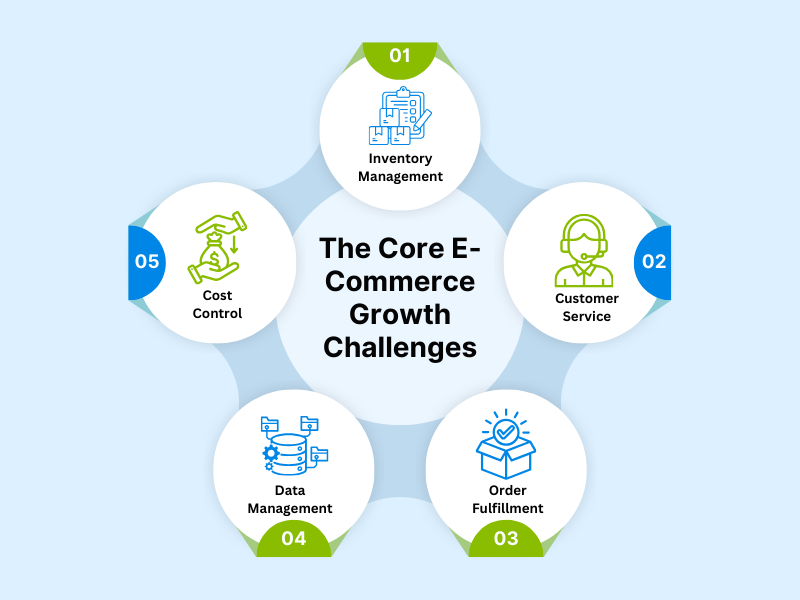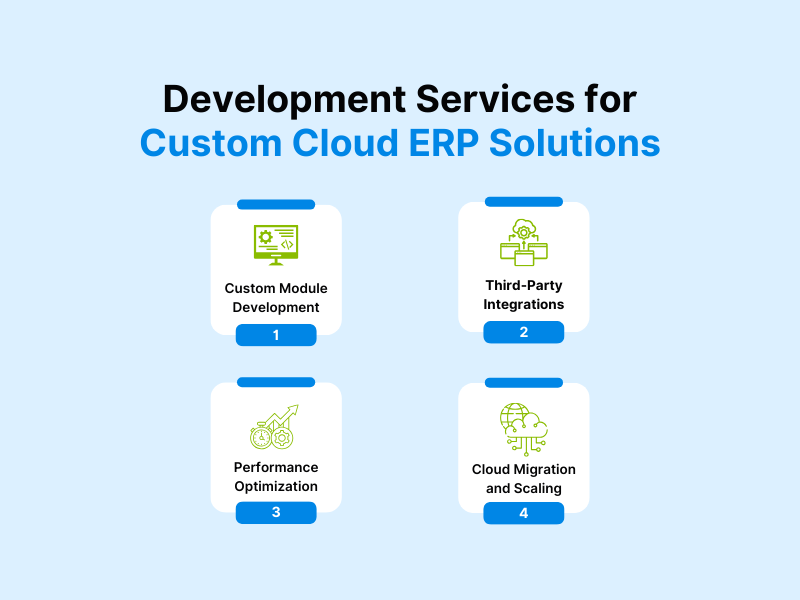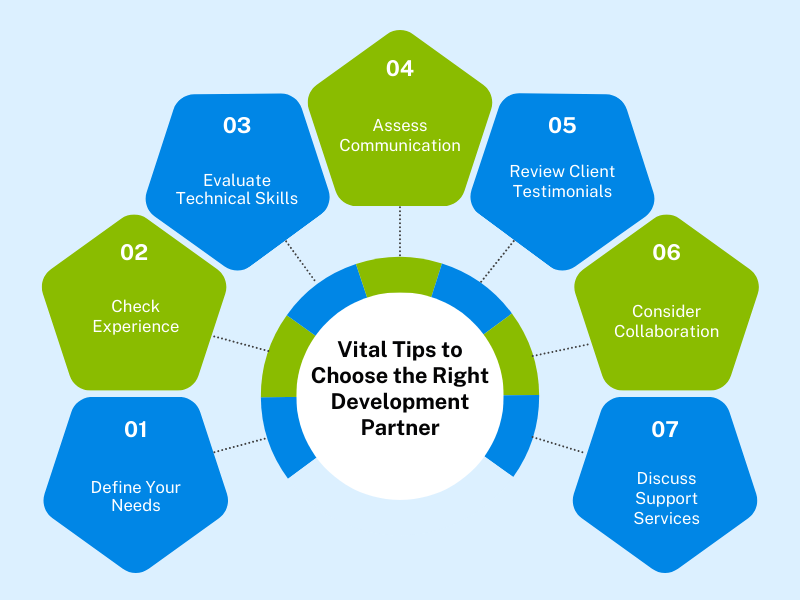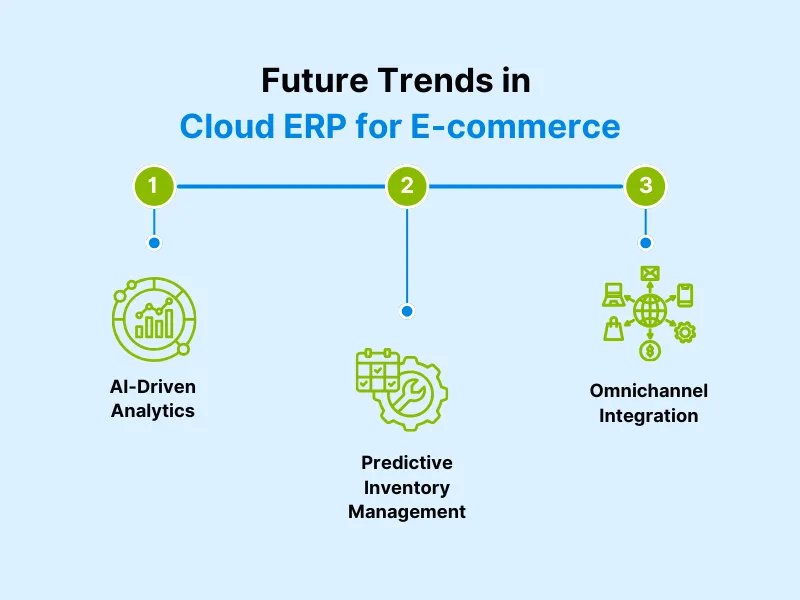Empowering eCommerce with Cloud ERP for Scalable Growth and Seamless Services
Let’s face it. Cloud-based enterprise resource planning software has become a must-have asset for all eCommerce platforms looking to upscale their business operations and gain the upper hand in the continuously evolving and stringent competitive landscape.
eCommerce ERP system plays a versatile role in streamlining procurement to manage inventory, logistics, and financial processes efficiently.

Cloud ERP in the eCommerce Industry
In this era of a rapidly evolving digital landscape, eCommerce businesses must stay agile, flexible, scalable, and responsive to changing market conditions, consumer behaviors, and competition. One of the key drivers for obtaining and enhancing this agility and scalability is adopting cloud-powered enterprise resource planning systems.
As e-commerce platforms grow in scale and complexity, cloud ERP software takes the forefront by becoming a critical enabler of growth and efficiency. It empowers online businesses to upscale efficiently and handle processes seamlessly.
Moreover, cloud ERPs can smoothly integrate with third-party applications and adapt to fluctuating market conditions. We believe that cloud-based ERP systems will continue to be the main driving force behind the success of the eCommerce industry.
Our core purpose in writing this comprehensive blog is to make eCommerce business owners and strategic decision-makers explore how Cloud ERP revolutionizes eCommerce business operations and leads to scalable growth through the integration of next-gen technologies and expert development services.
The Significance of Cloud ERP in E-commerce
We have keenly observed that in recent years, eCommerce businesses have tackled diverse and unique challenges, from managing large volumes of transactions and inventory to coordinating supply chains and providing excellent customer service. All such issues can be rightly resolved through a comprehensive platform that serves as a central hub, providing real-time visibility across entire operations.
An Enterprise Resource Planning Software Powered by Cloud Development Services is a comprehensive and unified platform.
So, by integrating your eCommerce business with a Cloud-based ERP solution, you can reap benefits like streamlining processes, minimizing redundancy, and enabling top executives to make data-driven decisions quickly.
Plus, enhanced flexibility and scalability allow you to deal with fluctuating demand or seasonal spikes smartly. This means whether you experience enhanced website traffic, launch new product lines, or plan to expand your operations globally – these things are never going to bother you as Cloud ERP systems make quick and easy adjustments.
Scalability and Integration Defines Long-term Success
If we talk about cloud ERP’s integration capabilities, it can sync with the latest e-commerce technologies, including Customer Relationship Management (CRM) systems, payment gateways, and supply chain management tools. The integration allows businesses to maintain consistent workflows and flawless communication across all channels.
The recent trends in eCommerce software development suggest that businesses are increasingly relying on agile methodologies, DevOps practices, and microservices architecture, apart from cloud computing services to support their growth.
The next-generation technologies like AI, machine learning, and IoT enhance Cloud ERP systems, offering predictive analytics, personalized experiences, and automated supply chain management for greater efficiency. Cloud-based ERP solutions help to lower IT costs by eliminating the need to invest in expensive hardware and ongoing maintenance.
Empower Your Online Store With Advanced Cloud ERP Solutions for Limitless Growth Potential.
Unlock the benefits of seamless integrations for lasting success
The Role of Cloud ERP in E-commerce Growth
While researching how Cloud ERP contributes to the growth and scalability of e-commerce businesses, we came across an Oracle NetSuite article that mentions that a modernized ERP is an organization’s operational backbone. It supports almost all critical functions, including manufacturing, inventory management, sales, accounting, human resources, and supply chain management.
ERP software solutions modular designs, enable businesses to scale only the specific features they want to implement and use currently. Businesses leverage flexible, real-time solutions and centralized data insights to simplify operations. This agility positions e-commerce businesses for sustained growth and seamless scalability.
However, at the same time, we have also seen how some eCommerce companies fell flat due to various reasons, one of them being not able to keep pace with the growing and changing consumer demands. While an ERP system powered by the cloud can provide a robust foundation for scalability, eCommerce businesses still face several critical challenges during the expansion phase.
The Core E-Commerce Growth Challenges

Here, we will discuss how eCommerce businesses face significant hurdles in their core processes like inventory management, customer service, and order fulfillment when they fail to keep the right systems in place.
- The first crucial challenge is related to inventory management. As sales volume increases, tracking stock levels across multiple warehouses, marketplaces, and suppliers becomes more complex. Businesses may face stockouts, overstocking, or misplaced inventory without a proper centralized ERP system, resulting in lost sales and wasted resources.
- The next challenge that eCommerce companies tackle due to a non-scalable solution is handling customer service with efficiency and speed. Businesses may experience peak customer volumes, including inquiries, requests, and complaints, especially during special events, such as Black Friday. Handling these in a timely and personalized manner becomes difficult without the right tools, often leading to delays or miscommunication, leading to customer dissatisfaction.
- Concerns related to order fulfillment can become a daunting task for eCommerce businesses, especially if the venture starts scaling. Managing increased order volumes requires seamless coordination between sales, inventory, and shipping processes. Inefficient systems can lead to delays, incorrect orders, or missed deliveries, resulting in dissatisfied customers and potential loss of reputation.
- During research, our expert team found that efficient data management has also become an increasingly complex issue when eCommerce firms begin to upscale. They generate and have to manage massive data volumes related to customers, sales, and financial transactions. Without implementing advanced cloud-based ERP, the data may become fragmented, resulting in poor decision-making and inefficient operations.
- Finally, cost control becomes a challenge. As operations expand, so do costs related to warehousing, logistics, technology, and staffing. Managing these expenses effectively while maintaining profitability is crucial for sustained growth.
How Cloud ERP Addresses These Challenges Efficiently
In this section, our expert team will focus on helping you understand the role of Cloud ERP software in addressing the challenges of e-commerce growth and scalability.
Provides a Centralized System for Inventory Management
- Real-Time Stock Visibility - Cloud ERP provides a centralized platform for real-time visibility of stock levels across multiple locations and sales channels. This allows ecommerce businesses to track inventory instantly and prevent overstocking and stockout situations.
- Automated Alerts - Advanced inventory management tools also provide automated alerts that help to trigger reorder points when the stock reaches a certain threshold, ensuring that supply meets demand.
- Accurate Demand Forecasting - Cloud ERP systems can analyze historical sales data to provide accurate demand forecasting, helping businesses optimize stock levels and reduce excess inventory.
Integration With Customer Relationship Management (CRM) Tool
- 360-Degree Customer View - ERP software seamlessly integrates with the customer relationship management system to provide a 360-degree view of each customer. This allows customer service teams to access detailed information about order histories, preferences, and interactions, enabling them to deliver personalized and responsive service.
- Automating Processes - Automating various processes further enhances customer support by streamlining routine tasks such as order tracking, returns processing, and handling inquiries.
- Real-Time Access to Customer Data - With real-time access to customer data, support teams can resolve issues faster, improving customer satisfaction and loyalty even as the business grows.
Automating the Order Fulfillment Process
- Automate Key Operations - Cloud-enabled enterprise resource planning software automates key processes such as order processing, shipping, and delivery tracking. It integrates with third-party logistics providers, including shipping companies.
- Real-Time Updates on Orders - The system provides real-time updates on order statuses, allowing businesses and customers to track shipments from the moment of purchase to delivery. It reduces delays, errors, or miscommunications, ensuring smoother operations and higher customer satisfaction.
Data Consolidation and Up-to-Date Information
- Data Consolidation - ERP solutions excel in efficient data management and help to consolidate data from various departments and channels into a single, centralized platform.
- Offers Updated Information - It eliminates data silos and ensures that decision-makers have access to accurate, up-to-date information. This real-time data helps businesses identify trends, optimize processes, and make informed decisions that drive growth.
Automation of Repetitive Tasks to Lower Costs
Cloud ERP aids in cost control by automating routine processes and optimizing resource allocation. By streamlining workflows, businesses can reduce operational inefficiencies, lower overhead costs, and increase profitability, ensuring sustained growth as the business scales.
E-Commerce Companies That Have Scaled Successfully Using Cloud ERP Solutions
Let us illustrate our point about how cloud ERP helps in successfully scaling e-commerce businesses through a few top examples.
Amazon.com Uses SAP ERP to Manage Its Massive eCommerce Infrastructure.
The first example that we have put forward is that of Amazon.com — the world’s largest ecommerce company that uses SAP ERP to scale its vast e-commerce operations by streamlining core business processes such as supply chain management, financial planning, and customer service. Through seamless integration with artificial intelligence technology, SAP ERP provides Amazon with real-time insights, enabling efficient decision-making, cost control, and customer satisfaction.
Walmart Optimizes Supply Chain Management Using Oracle ERP Cloud
In the second instance, we came across a case study that highlighted how Walmart implemented Oracle ERP Cloud to enhance its supply chain management. The case study reveals that Walmart integrated real-time data analytics to automate inventory tracking and optimize procurement and distribution. The Retail ERP Software tools streamlined operations, reduced costs, and improved decision-making efficiency.
After defining the examples, let’s take up a case study to understand ERP’s contribution to upscaling eCommerce platforms with Retail ERP Software.
The following case study is about a leading German online retailer that sells men’s grooming products. The online retailer faced various operational inefficiencies and implemented NetSuite ERP, a powerful Retail ERP Software, to overcome them. The key challenges were using legacy spreadsheets that failed to manage increasing sales, difficulty in handling inventory costs, and manual data entry, leading to booking errors.
The Solution
Implementing NetSuite ERP, a specialized Retail ERP Software, helped the online retailer centralize operations, automating tasks like inventory management and COGS calculation. It eliminated the need for manual data entry, streamlining financial reporting and improving accuracy. Automation and integration enhanced its efficiency and minimized errors.
Results
The implementation of NetSuite ERP allowed Fulton & Roark to correct inventory mistakes, boost sales by 50% year-over-year without increasing staff, eliminate reliance on external accountants, and gain better insights into margins, driving eCommerce growth with Retail ERP Software.
Integrating Advanced Technologies with Cloud ERP
This is the age of digital transformation and almost all industries, including the eCommerce sector, are reaping the full potential of next-gen technologies to revolutionize a wide range of operations and tasks. You have already heard and are familiar with these cutting-edge technologies, such as Artificial Intelligence, Machine Learning, and the Internet of Things.
The integration of these top technology trends with cloud ERP software is allowing eCommerce companies to automate processes, improve decision-making, and provide better customer experiences.
Let’s take AI-powered Analytics as an example. It uses artificial intelligence solutions to analyze and extract meaningful insights for eCommerce businesses that help them make accurate predictions or personalize recommendations. It also assists eCommerce companies in driving improved decisions through automation and acceleration of data analysis.
AI analytics is helping eCommerce platforms optimize inventory management, ensuring that stock levels are maintained efficiently to meet customer demand without overstocking.
We came across an article on Amazon that detailed how Amazon.com, uses AI to build a more sustainable future. AI has helped the largest eCommerce company to reduce packaging use, identify damaged items, and monitor goods to minimize waste, lower carbon footprint, and much more.
Similarly, let's talk about the role of machine learning algorithms. They analyze historical sales data to predict future trends, allowing businesses to forecast inventory needs more accurately and reduce waste. This predictive capability minimizes stockouts and excess inventory, improving the bottom line.
The Internet of Things (IoT) is another innovative technology that seamlessly connects eCommerce platforms with real-time data from interconnected devices. The powerful IoT sensors are embedded in warehouse or retail locations to monitor inventory levels, track shipments, and even control environmental factors like temperature.
The popular clothing brand H&M has launched IoT and Blockchain-based clothes rental services, enabling customers to hire real-time garments by scanning IoT-connected stickers with their smartphone.
Also, our discussion will be incomplete without highlighting the role of AI-powered recommender systems in eCommerce that has augmented customer shopping experience to a new level. These recommender engines use advanced AI algorithms to analyze customer behavior, preferences, and purchase history, sending personalized product suggestions and creating targeted marketing campaigns, leading to higher conversion rates and better customer satisfaction.
To optimize inventory management, machine learning models analyze historical data to predict demand fluctuations, allowing businesses to adjust stock levels proactively. The algorithms help in automated reordering, streamlining warehouse management, and ensuring real-time visibility into shipments.
This visibility allows e-commerce companies to adjust delivery routes, avoid delays, and keep customers informed of their order status in real-time.
When Cloud ERP integrates seamlessly with technologies like AI and IoT, it results in a significantly improved customer experience. AI-driven chatbots and virtual assistants can be deployed to handle customer inquiries, reducing response times and ensuring that customers receive instant support.
Integrating Cloud ERP with CRM Payment Gateways, and Logistics
One of the most significant benefits of Cloud ERP for e-commerce businesses is its ability to seamlessly integrate with other critical systems, including Customer Relationship Management (CRM) platforms, payment gateways, and logistics networks. This integration enables a unified, end-to-end approach to business operations that enhances efficiency, customer service, and overall performance.
CRM and Cloud-powered ERP integration pave the way for centralizing and digitalizing customer data, allowing businesses to track interactions, manage customer inquiries, and provide more personalized service.
It further ensures that online platforms have comprehensive information on the customer’s journey from initial inquiry to post-purchase support. This provides viable opportunities for cross-selling and upselling, boosting revenue while building stronger customer relationships.
Payment gateway integration with Cloud ERP further simplifies operations by streamlining the payment process. Transactions are automatically recorded in the ERP system, ensuring accurate financial reporting and reducing the risk of human error.
E-commerce businesses can manage multiple payment methods, currencies, and tax regulations, providing a smooth checkout experience for customers across various regions.
Additionally, integrating logistics and shipping platforms with Cloud ERP improves the entire order fulfillment process. With real-time tracking and automated updates on inventory levels, shipping status, and delivery times, businesses can ensure that products are delivered promptly and accurately. Customers benefit from faster shipping and transparent order tracking, leading to a more satisfying shopping experience.
Manage Your eCommerce Business and Online Stores Like a Pro With Cloud ERP Solutions.
Automate processes improve inventory management and access real-time data
Custom Development Services for E-commerce Cloud ERP
E-commerce businesses operate in highly dynamic environments where flexibility and scalability are crucial for success. Cloud ERP solutions provide a broad range of capabilities, but off-the-shelf systems often fall short of addressing unique operational requirements.
This is why custom development becomes essential. By tailoring Cloud ERP solutions, e-commerce businesses can align the system with their specific workflows, product catalogs, inventory management, customer relationship strategies, and financial processes.
For instance, Patrick Jean, CTO of Out Systems, stresses that custom-built solutions are scalable, enabling businesses to adapt as they grow. On the other hand, according to Jeff Lawson, CEO of Twilio, custom software allows companies to create solutions tailored to their specific workflows and goals.
A one-size-fits-all ERP system may lead to inefficiencies, while a custom solution offers the agility and flexibility needed to stay competitive in an ever-changing market.
Development Services for Custom Cloud ERP Solutions

Different types of development services play diverse roles in ensuring that Cloud ERP systems meet the unique needs of an e-commerce business. A few critical ones include
- Custom Module Development - Businesses often require additional modules to cover unique functionalities, such as multi-channel sales integrations, dynamic pricing algorithms, or custom reporting dashboards. Custom module development allows businesses to extend the core functionality of their ERP system with tailored solutions.
- Third-Party Integrations - Seamlessly integrating with existing third-party tools is critical for smooth e-commerce operations. Custom development can link the ERP system with CRM platforms, payment gateways, shipping services, or marketing automation tools, providing a unified ecosystem for enhanced efficiency.
- Performance Optimization- Ensuring the ERP system is fast, secure, and capable of handling high volumes of data is essential for e-commerce businesses. Performance optimization services focus on enhancing load times, improving database performance, and ensuring seamless scalability during peak business seasons.
- Cloud Migration and Scaling - Migrating legacy systems to the cloud and scaling ERP solutions based on business growth are key services. Custom development ensures a smooth transition while maintaining data integrity and minimizing disruptions.
Technology Frameworks & Tech Stack for Cloud ERP Development
Choosing the right technology stack is crucial for developing a robust and scalable Cloud ERP solution. Here are some of the most commonly used frameworks and technologies.
Let’s first tack up the backend framework which acts as the foundation for cloud ERP eCommerce solutions. The server side manages data, logic, and communications with databases and other systems. The popular backend frameworks are
- Node.js - NodeJS development services help to create fast and scalable server-side applications with real-time processing capabilities.
- Python - It offers simplicity and extensive libraries for handling complex ERP functionalities.
- Java - The framework ensures better reliability and scalability for large-scale ERP systems.
- .NET - Microsoft .NET development services provide robust enterprise-level frameworks for building secure and high-performance ERP solutions.
For example, Node.js powers eBay by enabling real-time, scalable applications, efficiently handling high traffic volumes and asynchronous data processing, ensuring fast, seamless interactions for millions of users.
The front end or the client side seamlessly handles user interface and user experience design aspects of the Cloud ERP, ensuring responsive and interactive applications.
- AngularJS - This is a popular JavaScript and TypeScrpt-based free and open-source web development framework powered by Google that provides a structured framework for building enterprise-grade web applications.
- ReactJS - It is a free and open-source JavaScript library, which is widely used to develop user interfaces based on components by Facebook Inc. It is powered and maintained by Meta and delivers a dynamic and flexible UI with reusable components.
- Vue.js - VueJS development services is an open-source JavaScript framework for developing user interfaces and single-page applications, created by Evan You and maintained by its core team. It offers a lightweight and adaptable solution for building user-friendly interfaces.
China-based popular eCommerce company Alibaba benefits from Vue.js by creating highly responsive and dynamic user interfaces, improving performance, and enhancing user experience across its large-scale, data-driven eCommerce platform.
The role of robust databases is to store and organize massive ERP data efficiently and securely for easy and quick retrieval and manipulation of insights. The crucial databases employed here are
- MySQL - MySQL is a free and open-source relational database management system that organizes data into one or more tables where relationships between the data help organize and define its structure. It is highly reliable for storing structured data in ERP systems.
- PostgreSQL - It is a robust, open-source relational database ideal for ERP data storage, offering advanced features like complex queries, data integrity, and scalability to handle large datasets and ensure seamless data management across ERP systems.
- MongoDB - MongoDB is a flexible, NoSQL database suited for ERP data storage, enabling the handling of unstructured or semi-structured data, scalability, and high performance for dynamic and evolving ERP applications.
MongoDB powers eCommerce platforms and online retail stores with catalog and inventory management, providing seamless customer shopping experience, personalization, and real-time intelligence.
Now, we want to talk about advanced cloud engineering services and a consolidated migration strategy that allows eCommerce businesses to host and scale ERP systems using a robust infrastructure.
- AWS - Hire AWS developers to get scalable and reliable cloud infrastructure for ERP systems, offering a broad range of services including storage, computing power, and machine learning to optimize ERP performance.
- Microsoft Azure - Azure delivers enterprise-grade cloud infrastructure for hosting ERP systems, with seamless integration to Microsoft tools, enhanced security, and global scalability to ensure smooth operations and data management for businesses of all sizes.
- Google Cloud (GCP) - GCP offers high-performance computing and advanced AI capabilities for ERP systems, providing robust infrastructure, flexible scaling, and extensive tools to optimize data storage, processing, and analytics.
Here, we can highlight the role of AWS Personalize, a comprehensive cloud-based machine-learning service that real-time data to generate customer recommendations. Popular brands like Lotte Mart and Discovery have leveraged their services to witness a considerable increase in product demand.
Technology Frameworks & Tech Stack for Cloud ERP Development
Choosing the right technology stack is crucial for developing a robust and scalable Cloud ERP solution. Here are some of the most commonly used frameworks and technologies.
Let’s first tack up the backend framework which acts as the foundation for cloud ERP eCommerce solutions. The server side manages data, logic, and communications with databases and other systems. The popular backend frameworks are
- Node.js - NodeJS development services help to create fast and scalable server-side applications with real-time processing capabilities.
- Python - It offers simplicity and extensive libraries for handling complex ERP functionalities.
- Java - The framework ensures better reliability and scalability for large-scale ERP systems.
- .NET - Microsoft .NET development services provide robust enterprise-level frameworks for building secure and high-performance ERP solutions.
For example, Node.js powers eBay by enabling real-time, scalable applications, efficiently handling high traffic volumes and asynchronous data processing, ensuring fast, seamless interactions for millions of users.
The front end or the client side seamlessly handles user interface and user experience design aspects of the Cloud ERP, ensuring responsive and interactive applications.
- AngularJS - This is a popular JavaScript and TypeScrpt-based free and open-source web development framework powered by Google that provides a structured framework for building enterprise-grade web applications.
- ReactJS - It is a free and open-source JavaScript library, which is widely used to develop user interfaces based on components by Facebook Inc. It is powered and maintained by Meta and delivers a dynamic and flexible UI with reusable components.
- Vue.js - VueJS development services is an open-source JavaScript framework for developing user interfaces and single-page applications, created by Evan You and maintained by its core team. It offers a lightweight and adaptable solution for building user-friendly interfaces.
China-based popular eCommerce company Alibaba benefits from Vue.js by creating highly responsive and dynamic user interfaces, improving performance, and enhancing user experience across its large-scale, data-driven eCommerce platform.
The role of robust databases is to store and organize massive ERP data efficiently and securely for easy and quick retrieval and manipulation of insights. The crucial databases employed here are
- MySQL - MySQL is a free and open-source relational database management system that organizes data into one or more tables where relationships between the data help organize and define its structure. It is highly reliable for storing structured data in ERP systems.
- PostgreSQL - It is a robust, open-source relational database ideal for ERP data storage, offering advanced features like complex queries, data integrity, and scalability to handle large datasets and ensure seamless data management across ERP systems.
- MongoDB - MongoDB is a flexible, NoSQL database suited for ERP data storage, enabling the handling of unstructured or semi-structured data, scalability, and high performance for dynamic and evolving ERP applications.
MongoDB powers eCommerce platforms and online retail stores with catalog and inventory management, providing seamless customer shopping experience, personalization, and real-time intelligence.
Now, we want to talk about advanced cloud engineering services and a consolidated migration strategy that allows eCommerce businesses to host and scale ERP systems using a robust infrastructure.
- AWS - Hire AWS developers to get scalable and reliable cloud infrastructure for ERP systems, offering a broad range of services including storage, computing power, and machine learning to optimize ERP performance.
- Microsoft Azure - Azure delivers enterprise-grade cloud infrastructure for hosting ERP systems, with seamless integration to Microsoft tools, enhanced security, and global scalability to ensure smooth operations and data management for businesses of all sizes.
- Google Cloud (GCP) - GCP offers high-performance computing and advanced AI capabilities for ERP systems, providing robust infrastructure, flexible scaling, and extensive tools to optimize data storage, processing, and analytics.
Here, we can highlight the role of AWS Personalize, a comprehensive cloud-based machine-learning service that real-time data to generate customer recommendations. Popular brands like Lotte Mart and Discovery have leveraged their services to witness a considerable increase in product demand.
Vital Tips to Choose the Right Development Partner

Selecting the right development partner is crucial for the success of a custom Cloud ERP solution. Look for a partner with deep expertise in the relevant technologies mentioned above, and with proven experience in delivering ERP solutions for e-commerce businesses. Here, you can follow these vital tips.
- Define Your Needs - Clearly outline your project requirements, goals, and budget to ensure alignment with potential partners.
- Check Experience - Look for partners with relevant industry experience and a portfolio showcasing similar projects.
- Evaluate Technical Skills - Ensure the partner has expertise in the technologies and frameworks that match your project requirements.
- Assess Communication - Choose a partner that communicates effectively and is responsive to your queries and concerns.
- Review Client Testimonials - Read reviews and testimonials to gauge the partner's reliability, professionalism, and ability to meet deadlines.
- Consider Collaboration - Look for a partner that promotes collaborative working methods and values your input throughout the development process.
- Discuss Support Services - Ensure they offer ongoing support and maintenance post-launch for a smooth experience.
Transform Your E-Commerce Operations With Cloud ERP For a Competitive Edge
Start driving efficiency growth and profitability in your business today
Overcoming Challenges in Cloud ERP Implementation
Implementing Cloud ERP for e-commerce can present vivid challenges and pose various hurdles for software developers from effective data migration and integration complexities to ensuring smooth user adaption. In this particular section, we will discuss these challenges and mainly focus on providing their best and most viable solutions.
The Key Implementation Challenges
- Data Migration - The first challenge is transferring large volumes of data from legacy systems to the cloud, which can be complex and risky, potentially leading to data loss or inaccuracies.
- User Adoption - Some eCommerce companies and online businesses may resist change, especially if they are accustomed to legacy systems, resulting in lower productivity during the transition.
- Integration with Existing Systems - Another core issue is ensuring seamless connectivity between the new Cloud ERP and existing applications that can pose compatibility issues and disrupt workflows.
The Best Practices to Overcome These Challenges
- Thorough Planning and Comprehensive Strategy: eCommerce companies must conduct a comprehensive assessment of existing data and systems before migration. They must create a detailed data and cloud migration strategy to ensure accuracy.
- Change Management: Online businesses must engage employees early in the process. They must provide training sessions and resources to ease the transition and foster a positive attitude toward the new system.
- Phased Implementation: Instead of a full-scale rollout, they should implement the Cloud ERP in stages. This approach allows for testing and troubleshooting, minimizing disruptions.
- Robust Integration Strategy: Leverage middleware solutions or APIs to facilitate smooth integration with existing applications, ensuring seamless data flow across systems.
To explain our point more emphatically, we can put forward a case study of the third-largest credit card company in the USA — Discover Financial Services, which implemented Oracle ERP Solutions to streamline its operations.
To begin with, the financial services company was facing challenges with managing several customized on-premises ERP systems, leading to slow reporting and scalability issues.
The Company decided to implement Oracle Fusion Cloud ERP and EPM to optimize its business processes. The result of incorporating a cloud-based modern ERP solution was that it enhanced financial reporting, increased planning accuracy, and reduced technology confusion. It also allowed the company employees to focus on outcomes and benefit from automatic cloud updates for continuous improvement.
Future Trends in Cloud ERP for E-commerce

The emerging trends and next-gen technologies are transcending the eCommerce industry to the next level and revolutionizing its versatile digital landscape. Infusing ERP systems in the cloud has completely transformed the customer shopping experience and automated operations.
Tech innovations like AI-powered analytics, predictive inventory management, and omnichannel integration intelligently contribute to a more agile and responsive eCommerce business model.
Transformative Features That Fuel Innovation
- AI-Driven Analytics - Artificial intelligence is transforming data analysis, enabling eCommerce businesses to extract actionable insights from vast datasets. For instance, platforms like Oracle and SAP now offer AI-driven analytics that can predict consumer behavior and optimize marketing strategies, leading to increased sales and customer satisfaction.
- Predictive Inventory Management - Cloud ERP solutions are increasingly incorporating predictive analytics to enhance inventory management. By forecasting demand based on historical data and market trends, e-commerce companies can reduce excess stock and avoid stockouts. For example, companies like Amazon leverage such features to ensure timely product availability, directly impacting customer loyalty.
- Omnichannel Integration - The paradigm shift toward omnichannel retailing necessitates seamless integration across various sales, marketing, and customer channels. Modern Cloud ERP systems facilitate this by unifying data from physical stores, online platforms, and marketplaces. This integration allows businesses to provide a consistent customer experience, crucial for retaining consumers in a competitive market.
Impact on eCommerce Businesses
After discussing the key transformative technologies enhancing eCommerce platform capabilities, it becomes essential to throw some light on how these trends and technologies will significantly impact eCommerce businesses. So, the answer is these innovations promise to enhance e-commerce operations significantly.
- For instance, AI-driven insights enable targeted marketing campaigns, boosting conversion rates.
- Similarly, predictive inventory management ensures that online businesses are always stocked appropriately, minimizing lost sales due to inventory issues.
- Omnichannel integration enhances customer engagement, allowing brands to meet customers where they are.
We are sure that as these evolutionary features emerge further, they will drive future growth in the e-commerce sector, helping businesses stay ahead of market demands and consumer expectations.
Conclusion
In the rapidly evolving e-commerce landscape, embracing Cloud ERP is not just a strategic choice but a necessity for achieving scalable growth and delivering seamless services. By integrating advanced technologies like AI-driven analytics and predictive inventory management, Cloud ERP systems empower businesses to make informed decisions and enhance operational efficiency.
Moreover, the flexibility of Cloud ERP solutions enables organizations to customize functionalities, ensuring that they can meet unique business needs and optimize processes for improved performance. With streamlined operations and real-time data access, companies can enhance customer experiences, reduce operational costs, and drive revenue growth.
According to the latest Markets and Markets Report, the Cloud ERP market is slated to grow to $130.5 billion by 2028 at a CAGR of 12.5%. On the other hand, Statista reports that the eCommerce market value is going to touch around $478 billion by 2029. All these stats and numbers are highly encouraging and indicate an illuminating future for cloud-based ERP software solutions.
However, implementing Cloud ERP comes with challenges such as data migration and user adoption, these can be effectively managed through strategic planning and robust change management practices. You may compare Azure vs. AWS comprehensively by reading our blog to make the optimal choice for your organization.
As competition intensifies, e-commerce businesses must prioritize agility and efficiency. Now is the time to explore Cloud ERP solutions that will keep you competitive and pave the way for sustainable growth. Embrace the future of e-commerce with Cloud ERP and unlock your business’s full potential.
FAQs
Cloud ERP-based eCommerce platforms integrate enterprise resource planning systems with online retail platforms, allowing businesses to manage operations like inventory, sales, and customer data in the cloud. This streamlines workflows enhances scalability, and enables real-time data access for better decision-making across the eCommerce ecosystem.
Cloud ERP systems benefit eCommerce by automating processes, improving inventory management, and providing real-time data analytics. They enhance scalability, boost efficiency, streamline order fulfillment, and offer seamless integration with various eCommerce tools, improving customer experience and enabling businesses to adapt quickly to market demands.
Integrating advanced technologies like AI, machine learning, and IoT with cloud ERP systems enhances eCommerce by optimizing demand forecasting, personalizing customer experiences, automating supply chain processes, and improving real-time decision-making. These technologies allow businesses to stay competitive and responsive to market trends.
Custom development services optimize cloud ERP systems for eCommerce by tailoring solutions to meet specific business needs. They enable seamless integration with third-party platforms, enhance user experience, add automation features, and ensure that the ERP system scales effectively as the business grows.
Transformative technologies like artificial intelligence (AI), machine learning (ML), Internet of Things (IoT), and blockchain are empowering cloud ERP-based eCommerce businesses. These technologies enable enhanced automation, real-time data analytics, improved supply chain management, personalized customer experiences, and secure transactions, driving operational efficiency and business growth.
TRooTech offers expert AI solutions tailored to your business. We handle everything from strategy to implementation, delivering scalable and secure AI systems. With a proven track record and focus on innovation, we ensure your project meets today’s needs and is ready for future growth.

